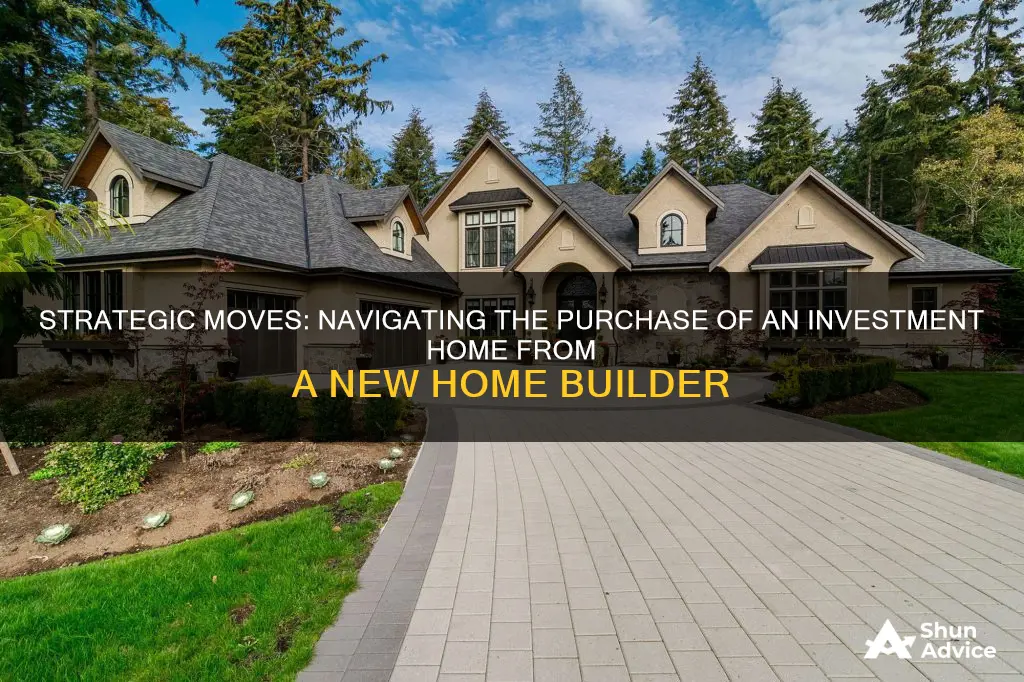
Buying an investment home from a new home builder can be a great way to get into your dream home. It offers the opportunity for customisation and the ability to choose everything from your floor plan to your finishes. However, it's important to be aware of the differences between buying a newly constructed home and an existing one. Here are some key things to keep in mind:
- Types of Newly Built Homes: You can choose between a custom home, where you have a say in every aspect of the planning and construction; a semi-custom home, where you have some leeway within a higher-end neighbourhood; or a spec or production home, which is almost pre-built with limited options to choose from.
- Financing Options: Unless you can pay cash, you'll need a mortgage lender to fund the transaction. Construction-to-permanent financing, also known as a One Time Close loan, is a popular choice as it offers both construction and mortgage financing in a single loan with one closing at the start of construction.
- Hire a Real Estate Agent: Consider hiring a real estate agent, especially if you're looking to buy a production or semi-custom home. They can negotiate on your behalf and ensure your best interests are represented.
- Timeline: Custom homes often come with less reliable timelines for completion, which can impact the sale of your current home and your living situation in between. It's important to work closely with your builder, agent, and lender to manage this process effectively.
- Research Builders and Neighbourhoods: Research local builders and their track records, and visit neighbourhoods to assess amenities, talk to current homeowners, and review homeowner's association rules and costs.
- Negotiate and Review Options: Review and negotiate the final sale price, taking into account interior and exterior options that will impact the price. Don't be shy about negotiating better mortgage rates and lender fees.
- Inspections: Schedule independent inspections to ensure everything is built as promised and in good working order. Review new home warranties to know what is covered and for how long.
| Characteristics | Values |
|---|---|
| Customisation options | Fully custom, semi-custom, spec |
| Role in construction and design | Purchasing an open spot of land and overseeing the entire project, buying a home in a planned neighbourhood with limited options |
| Steps to buying a new construction home | Secure preapproval from a lender, hire a real estate agent, know your timeline, research builders and neighbourhoods, negotiate and review options, schedule inspections |
| Pros | Dream home, newest technology, lower maintenance, fewer surprises |
| Cons | Expensive, may not go up in value, budget may be blown out |
What You'll Learn

Custom vs. semi-custom vs. spec homes
When it comes to building a new home, there are three main options: custom, semi-custom, and spec (or move-in-ready) homes. Each option has its own advantages and disadvantages, and the right choice depends on your needs, budget, timeline, and how much control you want over the details of your home.
Custom Homes
Custom homes offer the highest level of control and customization. You work directly with a homebuilder and possibly your own architect to design and select every detail of the home's construction, layout, and finish. This includes everything from the number of bedrooms and placement of light fixtures to the colour of the doorknobs. Custom homes are perfect for those who know exactly what they want and are willing to invest the time and money to make their dream home a reality. However, the process can be overwhelming and is often more expensive and time-consuming than other options.
Semi-Custom Homes
Semi-custom homes offer a balance between customization and convenience. They are typically built from pre-existing floor plans, and clients can choose from various feature options and request modifications before construction begins. This option provides some customization without the stress and cost of a fully custom home. Semi-custom homes are usually faster to build and more affordable, but they offer less control over the design and may have limited options for finishes and building materials.
Spec Homes
Spec homes, or move-in-ready homes, are built by the homebuilder to appeal to a wide range of buyers. The builder determines the floor plan, appliances, and features, and buyers have limited choices in terms of customization. Spec homes are ideal for those who want a new home without the time and effort of customizing every detail. They are also excellent investments if you plan to move in the future. However, spec homes may not offer the same level of personalization as custom or semi-custom homes.
Home Improvement: Who's Spending the Most?
You may want to see also

Mortgage financing
Construction Loans
If you're building a new home, you'll need to take out a construction loan. These are short-term loans that cover the costs of building a new house, including contractor fees, labour, and permits. Construction loans are typically for one year or less and are distributed incrementally as the building project progresses.
The main types of construction loans are:
- Construction-to-permanent loans: These finance the construction of a home and act as a mortgage once the home is built.
- Construction-only loans: These finance the construction only, and you'll need to repay the loan in full or take out a separate mortgage once the home is built.
- Renovation loans: These are for upgrading an existing home.
- Owner-builder construction loans: These are for licensed builders who will own the house they're constructing.
To qualify for a construction loan, you'll need to meet certain financial requirements, including a good credit score, a low debt-to-income ratio, and a down payment of at least 20%. You'll also need to provide a detailed construction plan and budget.
Traditional Mortgages
Once the construction is complete, you can either refinance your construction loan into a traditional mortgage or get a new loan to pay off the construction loan. Traditional mortgages usually have lower interest rates than construction loans and are issued for a set period until they are paid off.
To obtain a traditional mortgage, you'll need to meet the lender's financial requirements and provide documentation such as proof of income, assets, and employment. The lender will also require an appraisal of the property.
Rental Property Loans
If you're buying an investment property, you may be able to obtain a rental property loan. The process is similar to obtaining a mortgage for a primary residence, but there are some key differences. Lenders typically charge higher interest rates for rental properties due to a higher default rate.
The requirements for a rental property mortgage include:
- Credit score: A minimum score of 620, with better rates for scores of 740 and above.
- Down payment: Typically 15-25% for investment properties.
- Debt-to-income ratio: Your monthly debt payments should not exceed 75% of your expected rental income.
- Savings: You should have enough cash to cover 3-6 months of mortgage payments.
Nike: A Smart Investment Choice?
You may want to see also

Hiring a real estate agent
- Understanding their role: A real estate agent will represent your interests throughout the home-buying process. They will negotiate on your behalf, provide valuable insights about the local market, guide you through the complex paperwork, and manage communication with the builder.
- Experience and expertise: Look for a real estate agent who has extensive experience in new construction purchases. They should understand the unique aspects of buying from a builder, including the building process, timelines, and any potential delays. The agent should also have established relationships with local builders, which can streamline the process and provide valuable insights into their reputation and previous work.
- Advocating for your interests: The builder's agent will represent the builder's interests, so it's crucial to have your own agent who will advocate for your needs. Your agent should be a skilled negotiator, ensuring you get the best possible deal and addressing any issues that may arise.
- Guidance through the building process: A knowledgeable real estate agent can provide valuable insights into the building process, including timelines and potential delays due to weather, supply chain issues, or labour shortages. They can help you set realistic expectations and manage the moving timeline accordingly.
- Assistance with paperwork and inspections: Real estate transactions involve a lot of complex paperwork. Your agent can explain the various documents, look out for any red flags, and protect your interests. They can also guide you through the home inspection process, ensuring that any issues are identified and addressed before you take possession of the property.
- Fee structure and payment: In most cases, the seller (in this case, the builder) pays the commission for both the buyer's agent and the listing agent during the closing process. As a buyer, you are not typically responsible for paying your agent's commission directly. However, it's important to clarify this with your agent and understand the fee structure to avoid any surprises.
- Interview and selection process: Interview multiple real estate agents before making a decision. Discuss their experience with new construction purchases, their knowledge of the local market, and their availability to meet your timeline. It's important to find an agent who is a good personal fit and who understands your essential requirements for the investment home.
Retirement Savings: To Invest or Not to Invest?
You may want to see also

Location, location, location
When it comes to buying an investment home from a new home builder, location is of paramount importance. Here are some key factors to consider:
Accessibility and Transportation
The accessibility of a neighbourhood is crucial. Look for areas with good road infrastructure and easy access to public transportation, such as bus stops, subway stations, and airports. A well-connected location not only saves time but also contributes to a better work-life balance. Additionally, consider the proximity to major highways, public transit, and your workplace to optimise your commute and reduce transportation costs.
Amenities and Lifestyle
Research the availability of essential amenities, such as grocery stores, hospitals, schools, restaurants, shopping centres, and entertainment venues. Proximity to these amenities enhances the value of a property and ensures a hassle-free daily life. If you plan to have children or already have them, the quality of schools and family-friendly amenities become vital considerations.
Safety and Crime Rate
Choose a location with a low crime rate and a safe, inviting environment. Research crime statistics, talk to local residents, and visit the area at different times of the day to gauge its safety. A safe neighbourhood is crucial for your peace of mind and overall quality of life.
Development and Growth Potential
Consider the future development and growth prospects of the area. Are there any upcoming commercial projects, infrastructure improvements, or urban planning initiatives? Investing in an area with growth potential can lead to higher rental income and resale value.
Natural Disasters and Risks
Research the susceptibility of the area to natural disasters, flood zones, and other potential risks. This information is vital for making an informed decision to protect your family and property.
Cost and Budget
While a dream location is appealing, it's important to align your choice with your budget. Set realistic expectations and explore neighbourhoods that offer a balance between desirability and affordability.
Remember, when buying an investment home, location plays a significant role in the value of your property and can impact your daily life, well-being, and overall satisfaction with your purchase.
Is It Worth Investing in Ripple?
You may want to see also

Research builders and neighbourhoods
Researching builders and neighbourhoods is an essential step when buying an investment home from a new home builder. Here are some detailed tips to guide you through the process:
- Assess the builder's reputation: Research the track record of the builder you're considering. Look for online reviews, Better Business Bureau ratings, and testimonials from previous clients. Ensure they are licensed, insured, and have a good standing in the industry.
- Explore the neighbourhood: Drive around the neighbourhoods that interest you. Take note of the amenities, crime rate, schools, accessibility, and proximity to your favourite spots. Talk to current homeowners and get a sense of the community.
- Understand the homeowner's association: Review the rules and costs associated with the homeowner's association in the neighbourhood. Understand the fees, restrictions, and benefits that come with being a member.
- Compare multiple builders: Don't settle for the first builder you find. Get quotes from at least two or three builders to compare their services, costs, and timelines. This will help you make an informed decision and ensure you're getting a good deal.
- Check local development plans: Contact the town hall or local agencies responsible for zoning and urban planning. Inquire about any upcoming developments, such as new businesses, infrastructure projects, or changes in land use that may impact your investment.
- Research property values: Understand the valuation of the property you're considering. Use comparable sales data (recent sales of similar properties) to determine the market value and potential growth of your investment.
- Evaluate the builder's previous work: Look into the builder's past projects and review their portfolio. This will give you an idea of their construction quality, attention to detail, and design aesthetics.
- Consider local talent and suppliers: Prefer local builders as they often have stronger relationships with local talent and suppliers. They may be able to source materials at better prices and have a network of trusted subcontractors.
- Analyse the neighbourhood's growth potential: Assess the growth prospects of the neighbourhood. Look for indicators such as a growing population, revitalisation plans, low property taxes, good school districts, and walkable amenities like restaurants and parks. These factors can attract renters and increase the value of your investment over time.
Planning for Retirement Solo: Navigating Your Financial Future Independently
You may want to see also
Frequently asked questions
A new-construction home can be a solid investment due to its age. Its value may appreciate faster compared to an older home. You also get greater customisation options and lower maintenance costs. However, building a new home can be much more expensive upfront compared to buying an existing home, and there is less certainty as not all builders are created equal.
There are three major categories: custom, semi-custom, and spec/production. With custom homes, you can have a say in almost every aspect of the planning and construction. Semi-custom homes offer some customisation options, but within a limited range. Spec/production homes are almost pre-built, with only a few customisation options available.
First, you'll likely need mortgage financing unless you can pay cash for the home. Then, it's recommended to hire a real estate agent to represent your interests and ensure you get the best deal. Research builders and neighbourhoods to find a reputable builder and a suitable location. Choose a builder and design your new home, then get a home inspection before closing the deal.







